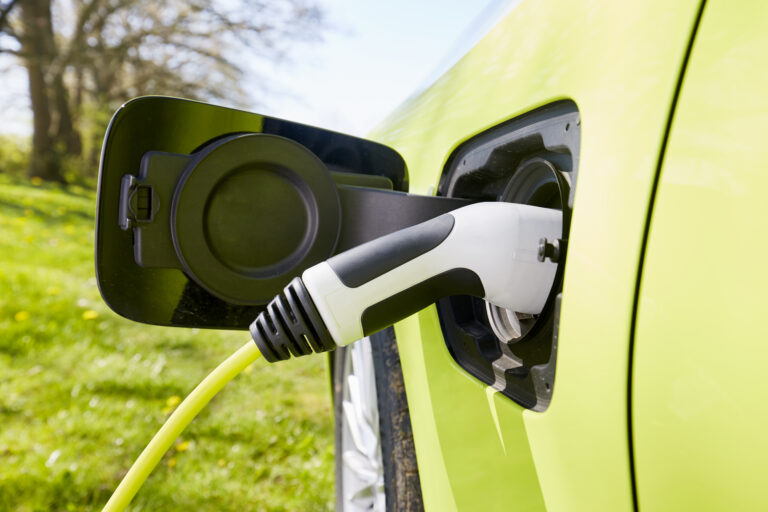
Electric vehicles are becoming more popular by the day. And as technology continues to improve — and the need for cleaner energy continues to grow — these cars are becoming not just more sought after, but more accessible. So what do we need to know about these vehicles of the future? First and foremost, is learning about the different types of electric vehicles.
These cars are not one-size-fits-all. From the manner in which they are powered to how far they can travel and how much they cost, there are some important aspects to sort through.
As the name implies, hybrid vehicles use both a gasoline engine and an electric motor. The motor in conventional hybrids cannot be plugged into an electrical source to be recharged. Instead, the motor’s battery gets its power from the gasoline engine as well as by capturing energy when the vehicle brakes. This process, which converts kinetic energy into electricity, is known as regenerative braking. The motor works with the engine to reduce gas consumption or even allows the engine to turn off.
Conventional hybrids offer a significant step up in fuel efficiency compared to traditional cars. The 2023 gas-powered Toyota Corolla gets an estimated combined MPG of 35, while the hybrid version has a combined MPG of 50.
Plug-in hybrid electric vehicles are also powered by both a gas engine and electric motor. What differentiates them from conventional hybrids is the way in which the battery is charged. In addition to using regenerative braking, PHEV batteries are charged by plugging in an electrical outlet.
The main advantage of a PHEV over a conventional hybrid is its ability to run on electricity alone. According to the U.S. Department of Energy, most PHEV can travel between 20 and 40 miles using only the electric battery. Because of this, plug-ins are substantially more fuel efficient.
The least common type of electric vehicle, fuel cell electric vehicles are powered by electricity – but not from a battery. Instead, they are equipped with tanks filled with hydrogen. The car’s fuel cell combines this hydrogen with oxygen to produce electricity to power the motor.
Hydrogen-powered cars are still an emerging technology. In fact, most FCEVs are currently only sold/leased in California (although the Toyota Mirai can be leased in Hawaii). But their potential – 400-plus miles of range, a refueling time of less than five minutes – means you’re likely to see them become more available in the near future as the refueling infrastructure grows.
Electric vehicles are generally more expensive than similar, gas-powered cars. Of all the types of electric vehicles, conventional hybrids are usually the least expensive. (The Toyota Prius has a starting MSRP below $25,000.) As you move into fully electric cars, the price goes up. You’ll be hard-pressed to find one below $30,000, while a luxury model can easily reach into the six figures.
Other savings brought in from electric vehicles offset some of these costs. The most notable savings come at the pump. A study by Consumer Reports found that fuel savings can reach $4,700 or more during the first seven years of owning an electric vehicle. The total ownership savings over a similar gasoline-only car, including repair and maintenance costs, ranges from $6,000 to $10,000.
Electric vehicles are also eligible for tax credits. The federal government awards credits between $2,500 and $7,500 for the purchase of qualified electric cars. Many state governments have similar programs. For example, New York provides a rebate of up to $2,000, while Massachusetts awards $2,500 for an all-electric vehicle and up to $1,500 for a plug-in hybrid.
Conventional hybrids do not need any external charging. They are powered by converting the vehicle’s own energy.
Plug-in hybrids and battery electric vehicles do need to be connected to an outside power source and there are options. Most owners will charge their cars at home. All electric vehicles can be plugged into a standard outlet. The only draw back to this method is the time is takes to recharge, usually eight or more hours. You can leave your car plugged in at night and be ready to go in the morning. But those who want to upgrade can install a wall-mounted charger in their home. This device delivers twice the voltage and cuts charging time in half.
The other popular option is using public charging stations. Though not as common as traditional fuel-pumping stations, the number of charging locations continues to grow. There are approximately 25,000 electric vehicle charging stations in the U.S. totaling roughly 80,000 charging outlets. Payment for the use of these outlets vary depending on the operator.
If you’re traveling a long distance, it’s always a good idea to plan out your route according to where you know you can get a charge. Motorists can find electric car charging stations with the free AAA Mobile app for iPhone and Android. The app can also be used to map a route, find discounts, book a hotel and access AAA Roadside Assistance.
AAA’s Recommendation: Whether you own an electric vehicle or a gas-powered car is up to you – and you should consider lots of factors in making that choice. No matter what type of vehicle you’re choosing, we recommend visiting a dealership, test driving one, and asking as many questions as possible to make an informed decision.

















